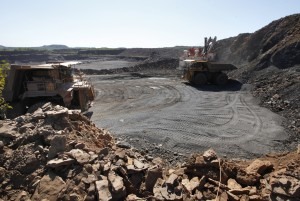Return to Nov. 27 Updates Home Events Site Map Archived Updates Politicians at Work
Help me out My name is KOEHN please do not confuse me with KUEHN

Mining will again be at the top of the state Legislature's agenda when it convenes in January. Legislators will debate changes to the state's permitting system for iron mines, similar to Minnesota's Hull Rust Mine on the famous Mesabi Range.
Lobbyists are pushing the state Legislature to take mine permit reform further and repeal the state's 15-year-old "moratorium" on mines that produce polluting acids.
Last session's failed mining reform efforts focused only on iron mines as opposed to operations that would remove metals such as gold, copper, zinc and silver. Unlike in iron mining, the processing of such base metals requires the use of chemicals and exposes surrounding sulfide minerals to air and water, which can create potent, polluting acids.
Because of such environmental threats, Wisconsin in 1997 passed a mining moratorium law that requires companies seeking permits for metallic sulfide mines to produce evidence of similar mines that operated safely and have been shut down and reclaimed for 10 years without polluting.
Passage of the law during the debate over a proposal by Exxon Minerals to build a mine near Crandon was considered a landmark victory for environmentalists. They consider the legislation to be a crucial part of the state's mine regulations.
"It was critically important," said Keith Reopelle, who works on environmental policy for Clean Wisconsin and was involved in the fight to pass the moratorium. "It really shaped mining policy in Wisconsin, to this day."
Mining advocates, however, view the moratorium as an unnecessary roadblock to more mining and the jobs they say mining would bring.
"We would take the stand that if the moratorium went away, that would be a very significant signal to mining companies," said Ron Kuehn, a lobbyist who represents Aquila Resources, an international mining company that actively explored two potential sites in northern Wisconsin: a gold deposit in Marathon County and a gold and copper deposit in Taylor County.
GOP opportunity
The recent election that gave Republicans control of both the state Senate and Assembly provides an opportunity to push harder to ease regulations for mining companies, Kuehn said.
State Sen. Robert Jauch, D-Poplar, a key player on mining issues, said it is apparent from early discussions on changes in mining regulations that Republicans are planning to attack the moratorium.
"I think that clearly is the direction they're going to go," Jauch said.
Jauch said the move would be controversial and added that separate legislation aimed at removing the moratorium may make it more difficult to garner bipartisan support for a new version of last session's failed mining bill.
That earlier bill was prompted by a proposal from Gogebic Taconite to build a $1.5 billion open pit iron ore mine in northern Wisconsin.
The company said such a mine could employ 700. A company official said Gogebic Taconite is no longer interested in the site after the state Senate failed to pass the bill.
Cullen said that will be followed in coming weeks by a public meeting at which the committee will begin writing a bill. He said such a bill would create a more definitive timeline for the state to permit a mine while keeping in place environmental protections.
Flambeau decision
State Sen. Scott Fitzgerald, R-Juneau, who was elected Senate Majority Leader last week, said mining is a priority and added he is hopeful a bipartisan permitting bill can be fashioned.
He was more circumspect about any action on the moratorium and said he has not heard of any specific efforts to bring forth legislation on the issue.
Kuehn said efforts to repeal the moratorium were prompted by a decision last summer in which federal Judge Barbara Crabb praised the operation of a now closed copper and zinc mine near Ladysmith.
In a decision prompted by a challenge from environmental groups, Crabb ruled that while Flambeau Mining Co. technically violated federal clean water laws, the discharges that were the subject of the lawsuit were slight and the company deserved "commendation, not penalties" for its operation.
The open pit mine operated from 1993 to 1997 and was reclaimed after its closure. The moratorium law requires a mining company seeking a permit to cite an example of a mine that operated safely for 10 years and has been closed for 10 years.
Technically, the mine, having operated for only five years, would not meet the first part of the requirement.
And environmentalists charged the closed mine did leak pollutants into a stream that feeds the Flambeau River, even though Crabb downplayed the pollution as minor and fined the company just $275.
Even so, the Crabb decision is being cited by Kuehn and others as reason to seek action on the moratorium.
"The logical step," Kuehn said, "is to ask the Legislature to take a look at the Flambeau decision. The moratorium says a company has to prove a mine was successfully closed for 10 years. Curiously, the best example of that we know of is right here in Wisconsin. That's our reading of it."
